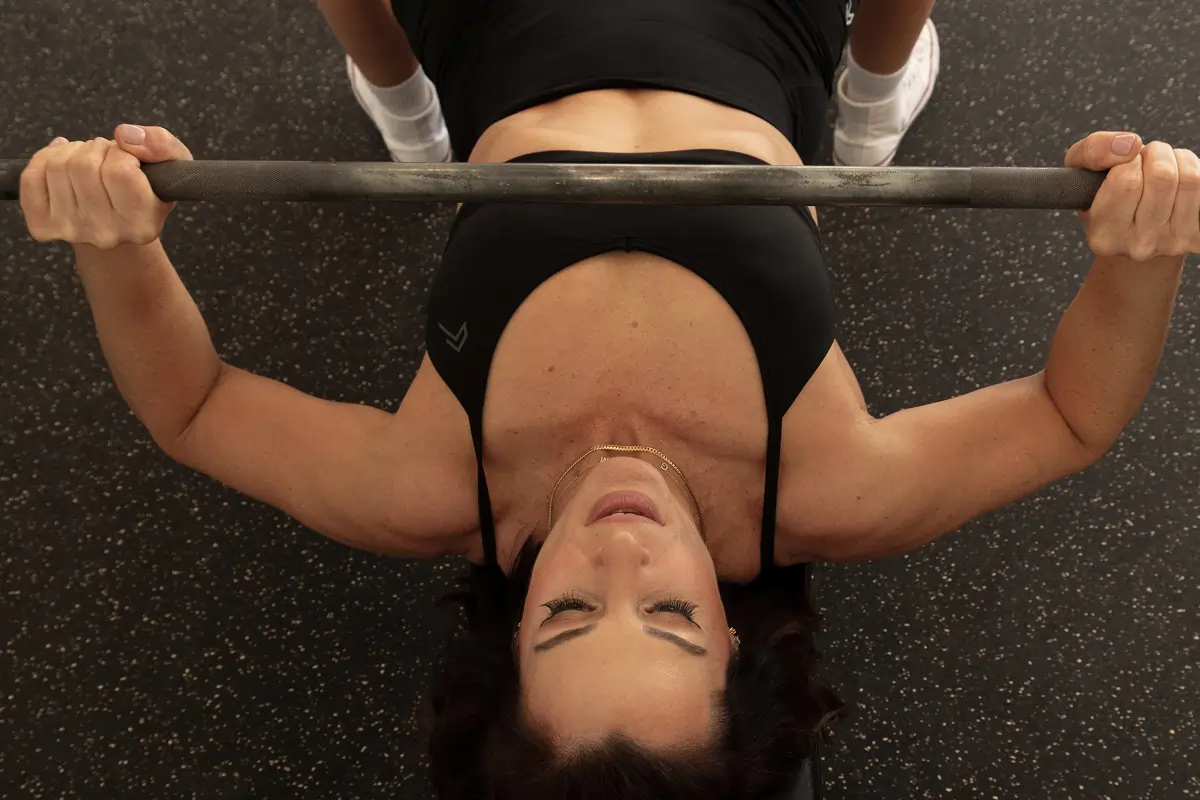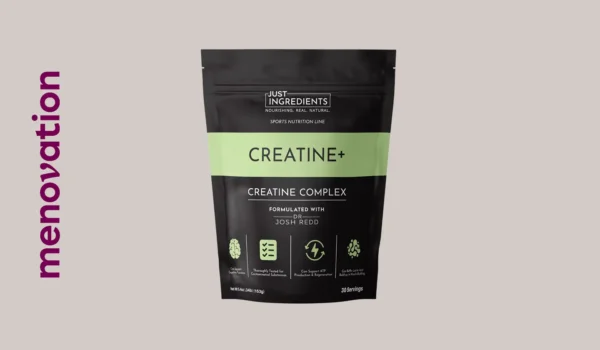Why Women Love Creatine for Perimenopause
By Ashley Nowe
Published:

Alright, let’s talk about perimenopause—the rollercoaster ride nobody warned us about. One day, you are doing great in your workouts and feeling strong. The next day, you wonder why your muscles feel weak. Your energy has dropped, and you keep losing your car keys.
Blame it on hormones! Estrogen levels start doing the cha-cha, and suddenly, everything feels just a little bit harder. But here’s the good news: creatine might just be the secret weapon your perimenopausal body needs.
Creatine for Perimenopause: The Supplement Your Body Has Been Begging For
What the Heck is Creatine, Anyway?
Creatine is a naturally occurring compound found in your muscles and brain. It helps create energy, build muscle, and support brain function. Let’s be honest, we could all use more of that.
Your body makes some creatine by itself. You also get some from foods like red meat and fish. Taking creatine as a supplement can help reduce some annoying side effects of perimenopause like fatigue, mood changes, and sleep issues. Creatine is more than just a way to improve exercise performance. I am a big believer that we don’t need a ton of supplements, but why did I sleep on creatine for so long?
Find out why I wish I started creatine earlier:
Why Creatine is a Perimenopausal Powerhouse
Perimenopause is a slow change. During this time, muscle mass, strength, and energy levels can decrease, like an old t-shirt fading. However, creatine can help slow this process down. Here’s how:
1. Keeps Your Muscles Strong
As estrogen dips, so does muscle mass. But creatine steps in to help increase strength, build lean muscle, and improve workout recovery. Whether you lift weights or try to carry all the grocery bags in one trip, creatine can help. It can make you feel stronger and more capable.
2. Boosts Energy and Fights Fatigue
Ever hit that mid-afternoon slump where even coffee can’t save you? Creatine helps your muscles produce and store energy, making everyday tasks—and workouts—a little easier. More energy = less dragging yourself through the day.
3. Supports Brain Function (Goodbye, Menopause Brain Fog!)
If you’ve ever walked into a room and immediately forgotten why you’re there, you’re not alone. Perimenopause can bring on brain fog, forgetfulness, and mental fatigue.
Creatine can help with brain function and improve memory. It also boosts mental clarity. This means you will have fewer moments of asking, “Where did I put my phone?”
4. May Help With Mood and Sleep
Perimenopause can sometimes feel like an emotional rollercoaster, and poor sleep doesn’t help. Some research shows that creatine may help balance mood and improve sleep quality. This can help you feel more like yourself again.
How to Take Creatine for Perimenopause
Alright, so you’re sold on trying creatine—now what? Using creatine is super simple.
- How much? The sweet spot is about 3-5 grams per day.
- When to take it? Anytime! Some people take it before workouts. However, creatine builds up in your system, so consistency is more important than timing.
- What kind? Look for creatine monohydrate—it’s the most studied, safest, and effective form.
- How to take it? Mix it with water, juice, or your morning smoothie—it’s tasteless and dissolves easily.
7 Ways to to Incorporate Creatine Into Your Daily Routine
Adding creatine to your day isn’t complicated—it’s one of the easiest supplements to fit into your routine. The key is making it a habit so you take it consistently and see the benefits. Here are a few simple ways to do that:
1. Stir It Into Your Morning Drink
An easy way to remember your creatine is to mix it into whatever you drink in the morning. Whether it’s coffee, tea, a smoothie, or just a glass of water, a scoop of creatine will dissolve quickly and go down without a fuss. If you’re a routine-driven person, tying creatine to your morning ritual makes it almost automatic.
2. Add It to Your Post-Workout Recovery Shake
If you’re already in the habit of drinking a protein shake or smoothie after your workout, just toss in your creatine. It blends seamlessly with protein powder, making it an effortless way to fuel your muscles and help them recover faster.
3. Pair It With a Meal
Another great way to remember your creatine is to take it at the same time as a meal, like breakfast or lunch. This can be especially helpful if you’re prone to forgetting supplements, as it becomes a part of something you’re already doing.
4. Keep It Visible
If out of sight means out of mind, try keeping your creatine container somewhere obvious—next to your coffee maker, in your pantry, or wherever you keep your vitamins and supplements. Seeing it daily makes it much more likely that you’ll actually take it.
5. Take It Anytime That Works for You
Unlike some supplements that require specific timing, creatine works best when taken consistently over time. So if mornings aren’t your thing, take it in the afternoon or evening instead. The most important part is just taking it every day!
6. Mix It With Electrolytes for Extra Hydration
If you struggle with dehydration or find that you’re not drinking enough water throughout the day, try mixing your creatine with an electrolyte drink. This is especially helpful if you’re active or tend to sweat a lot, as creatine helps with muscle hydration.
7. Travel With It
If you’re on the go, keep a small travel container of creatine in your bag so you can mix it into a drink when needed. Since it’s tasteless, it won’t mess with your favorite beverages.
Busting Creatine Myths (Because, Yes, Women Can and Should Take It!)
Let’s clear up some of the biggest misconceptions about creatine:
🚫 “Creatine will make me bulky.” Nope! It helps you build lean muscle, not bulk up like a bodybuilder.
🚫 “It’s only for hardcore athletes.” Also nope. Creatine is great for anyone wanting to maintain strength, energy, and brain function, especially as we age.
🚫 “It causes bloating.” Some people may notice a little water retention at first. This is temporary and usually means your muscles are getting extra hydration. This is actually a good thing!
More Benefits of Creatine for Women in Perimenopause and Post Menopause
- Increases Muscle & Strength – Helps maintain and build lean muscle mass, which naturally declines with age.
- Supports Maintaining Muscle – Prevents muscle loss that occurs because of hormonal changes in post-menopause women.
- Reduced Mental Fatigue – Enhances cognitive function, memory, and mental clarity, combating brain fog.
- Improves Energy Production – Boosts ATP levels to fight fatigue and improve daily stamina.
- May Help with Sleep Deprivation – Some studies suggest creatine can support better sleep quality and recovery.
- Better Workout Recovery – Helps muscles recover faster after exercise, reducing soreness.
- Keeps Your Bones Strong – Helps strengthen your bones and may lower the risk of osteoporosis.
- Helps Balance Your Mood – Might take the edge off mood swings and stress during hormonal shifts.
- Supports Metabolism – Helps maintain a healthy metabolism, which tends to slow post-menopause.
- Easy to Use & Safe – Well-researched, easy to add to daily routines, and beneficial for long-term health.
Favorite Supplements with Creatine for Menopause
If you’re interested in trying Creatine, below are a list of my favorites! (Links may include affiliate commissions but I only promote products I believe in!)
Beava Creatine Gummies
All the muscle gain, and so convenient to take in gummy form!
Just Ingredients Creatine (for sensitive tummies)
If you have a sensitive tummy, try this more highly processed creatine! They also ship to Canada!
Final Thoughts: Should You Try Creatine for Perimenopause?
If you are feeling the effects of perimenopause, like fatigue, muscle loss, or brain fog, creatine can help. Fighting these issues with creatine easy, safe, and research-supported. As one of the most studied supplements, adding it to your routine may help you feel stronger, sharper, and more energized.
So, why not give it a try? Your future self (and your muscles) will thank you!
Always talk to your doctor before starting any new supplement. Focus on a balanced approach to health. This includes exercise, good nutrition, and self-care.
How Menovation Can Help
Check out the Menovation app and become empowered during perimenopause and beyond. It features exercises, nutrition plans, and education for improved well-being, reduced symptoms, and inspiring self-care for confidence and vitality. Then tell a friend – we are trying to keep the lines of communication about peri(menopause) open, right?
Ready to feel stronger through perimenopause? The Menovation app is your go-to hub for perimenopause fitness, health tips, and support. Available now in the App Store and Google Play. Start free trial here.
As always, talk to a doctor or mental health professional about your experience. Don’t hesitate to contact a professional if you need extra support. If you have severe symptoms, want to learn about hormone therapy, or have other health issues, reach out for help.

